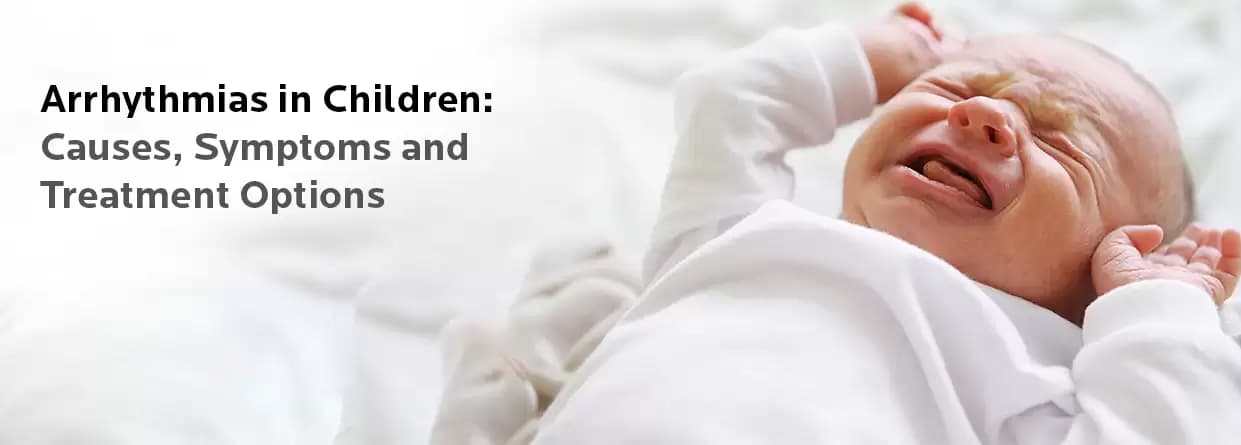
An arrhythmia in children is a condition affecting their heartbeat. It can change the regular heartbeat of a child, even rhythm. If your child is diagnosed with this condition, don’t get apprehensive as it is common among children like adults.
Rhythm is an innate and amicable part of life and in the sphere of the human body, the heart acts as the guide of this lovely harmony. The heart beats with unwavering regularity, orchestrating life’s flow throughout the body. However, when the rhythm stumbles, mainly in the most susceptible humans, children, it can turn the life of a mother upside down. Arrhythmia in children is a condition determined by irregular patterns of heartbeats that can upset the child’s life causing possible severe health problems.
However, the condition is more common in adults than children, but, even then, arrhythmias in children require more attention and comprehension.
In this blog, we will commence the discussion on the complicated routes of the pediatric heart and explore the obscure sphere of arrhythmia in children. We will discuss the condition’s complexities, and comprehend its causes, symptoms, diagnosis, and treatment options. If your child is diagnosed with arrhythmia, then you can book your appointment with a cardiologist in Kolkata at the BM Birla Heart Research Centre in Kolkata. You will find the most experienced and skilled pediatric cardiologists here.
Kindly note that the information given in this blog is based on our research and we do not interfere with the doctor’s consultation in any way.
An arrhythmia in children is a condition affecting their heartbeat. It can change the regular heartbeat of a child, even rhythm. If your child is diagnosed with this condition, don’t get apprehensive as it is common among children like adults. Also, it is usually harmless among children, but without early clinical intervention, it can get serious and even life-threatening.
Arrhythmia in children indicates the heart is beating either too fast or too slow, or else skipping a beat, and may have additional beats. In most cases, the condition doesn’t need treatment, but certain cases can get serious and might need timely treatment before it’s too late.
Symptoms of arrhythmia in children might vary depending on what type of arrhythmia they have, however, some of the common signs that one should look for are:
In serious cases, the symptoms of arrhythmia in children are:
Most children with supraventricular tachycardia or CVT don’t have any underlying structural heart problems. Several factors contribute to the development of arrhythmia in children. Here are these factors:
Healthcare experts often diagnose arrhythmia in children during a regular checkup or diagnosing other health conditions. One can also consult about the signs and symptoms if arrhythmia in children is suspected. The pediatric cardiologist will assess the health history of a child and the family’s medical history. Here are certain tests that might be recommended to confirm arrhythmia in children:
Most cases of arrhythmia in children don’t require treatment and doctors often suggest monitoring the child’s heart for some time. In some cases, the child might require treatment for an underlying cause of the condition. Here are some of the treatment options often recommended to treat arrhythmia in children:
Arrhythmia in children can bring a lot of apprehension in the heart of a mother as it makes their heart either too slow, too fast, or skip a beat. This kind of feeling is natural but it is vital to keep a check on the abnormal symptoms of the heart. Usually, some arrhythmias are not harmful in children, but in some cases, there might be a need for treatment like medications or in a rare case, surgical option. It is recommended to work with your doctor so that you can manage the condition efficiently for your baby.
If a child is experiencing fatigue, heart palpitations, chest pain, or shortness of breath, you must consult your doctor immediately.
The dangerous heart rate for a child with a fever is 200-220 and above.
Yes, fever is one of the reasons that cause a high heart rate in children.
Written and Verified by:

Dr. Ashok B. Malpani is a Senior Consultant in Cardiology Dept. at BM Birla Heart Hospital, Kolkata, with over 34 years of experience. He specializes in complex angioplasty, primary angioplasty, and pacemaker implantation.
Similar Cardiology Blogs
Book Your Appointment TODAY
© 2024 BMB Kolkata. All Rights Reserved.